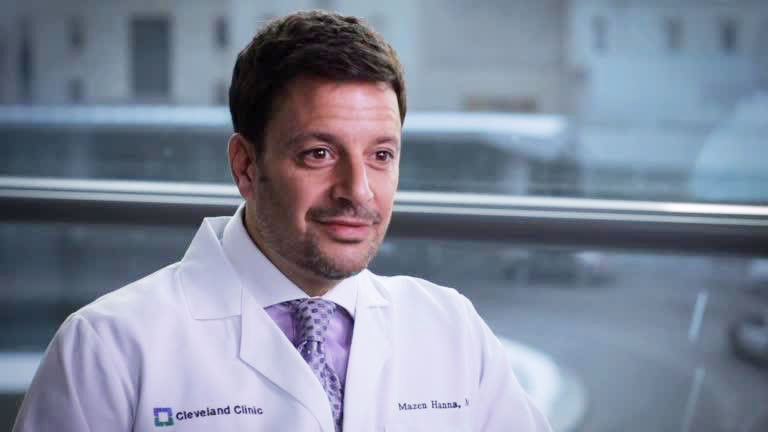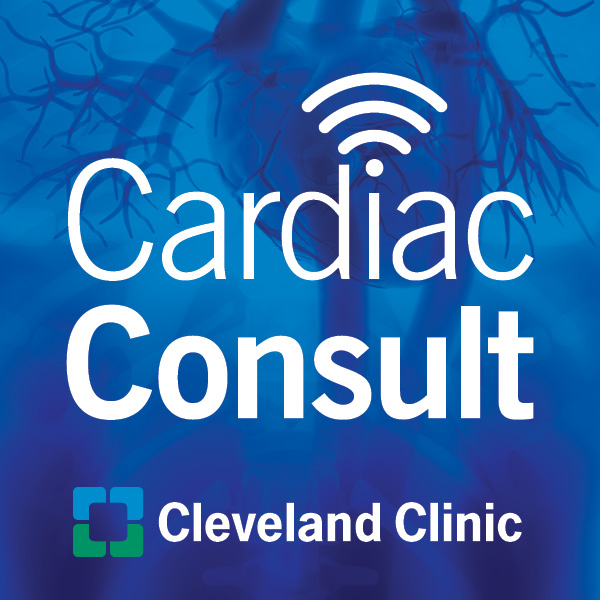Tafamidis Treatment for Patients with Transthyretin Amyloid Cardiomyopathy

Subscribe: Apple Podcasts | Buzzsprout | Spotify
Tafamidis Treatment for Patients with Transthyretin Amyloid Cardiomyopathy
Podcast Transcript
Announcer: Welcome to Cleveland Cardiac Consult, brought to you by the Sydell and Arnold Miller Family Heart and Vascular Institute at Cleveland Clinic. In each podcast, we aim to provide relevant and helpful information for healthcare professionals involved in cardiac, vascular, and thoracic specialties. Enjoy.
Dr. Hanna: We're here today to discuss an exciting trial that was published in the New England Journal of Medicine regarding Tafamidis, which is a treatment for transthyretin cardiac amyloidosis. This was published in August of 2018. Tafamidis is a medication that actually stabilizes transthyretin.
Dr. Hanna: What is transthyretin? This is a protein produced by the liver, and it's a tetramer. In amyloidosis, it breaks apart into foldamers, monomers, and then aggregates into amyloid fibrils. What Tafamidis does is binds in the dimer-dimer interface and connectively stabilizes it, such that it does not associate.
Dr. Hanna: The safety and efficacy of Tafamidis in TTR cardiac myopathy for the ATTR Act trial looked at 441 patients with either wild-type or hereditary cardiac amyloidosis and randomized them either to placebo, Tafamidis 20 milligrams, or Tafamidis 80 milligrams. They placebo number was 177 patients. The pool of Tafamidis patients were 264. The patients were followed for 30 months. The primary endpoint was all-cause mortality and frequency of heart failure hospitalizations. The key secondary endpoints were the change in six-minute walk and Kansas Cardiomyopathy Questionnaire, which is a quality metric.
Dr. Hanna: This was a very positive trial. If you look at all-cause survival, there was a substantial improvement in survival in the patients who were on Tafamidis versus placebo. You can see that over the 30 months, the curve started to separate at 18 months. At 30 months, 70.5% of the Tafamidis patients were alive, and 57.1% of the placebo patients were alive, and thus, the absolute risk reduction was 13.5%. The number needed to treat, in this study, is 7.5. That is 7.5 patients who were treated with Tafamidis would save one life at 30 months. This was a very impressive result, with a P-value of .001 statistical significance.
Dr. Hanna: What was interesting, that if you look at NYHA1 patients, NYHA2, and NYHA3, the patient who benefited the most were those who were earlier in the disease, that is NYHA1 and NYHA2, with a hazard ratio of only .35 in NYHA1 and .6 in NYHA2. So, the message here is earlier diagnosis.
Dr. Hanna: Additionally, when we get to these key secondary endpoints, when we look at the six-minute walk test, the decline in the six-minute walk over the 30 months was less in the pool Tafamidis group than the placebo group, and this curve separated at about six months. The same goes for the decline the in Kansas City Cardiomyopathy Questionnaire, which is a quality of life metric. The pool Tafamidis group was much less than that in the placebo group.
Dr. Hanna: What does this mean? When is this drug going to be FDA approved? We are not sure. We do believe it's going to be sometime in 2019. We don't know what it will cost. Currently, there is an extension trial of the original trial ongoing, and the Cleveland Clinic is participating. We should help patients get on the drug until it's FDA approved.
Dr. Hanna: I think this is a breakthrough in this field. Up until now, all we had was supportive care for this disease. Now, we actually have a proven therapy in a robust study with a very good outcome. It's now more and more important to make the diagnosis of TTR cardiac amyloidosis. It's important to make the diagnosis early because we'll finally be able to treat our patients.
Announcer: Thank you for listening. We hope you enjoyed the podcast. We welcome your comments and feedback. Please contact us at heart@CCF.org. Like what you heard? Please subscribe and share the

Cardiac Consult
A Cleveland Clinic podcast exploring heart, vascular and thoracic topics of interest to healthcare providers: medical and surgical treatments, diagnostic testing, medical conditions, and research, technology and practice issues.



